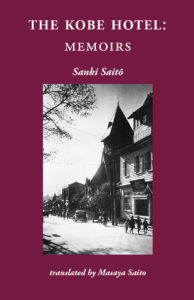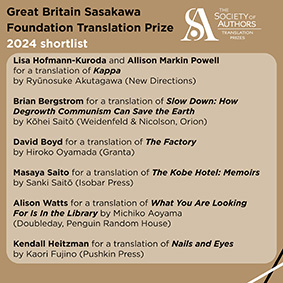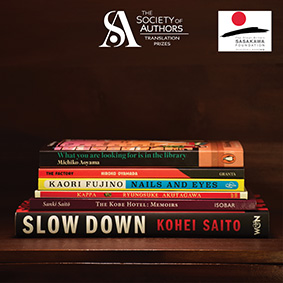Masaya Saito won the 2024 Great Britain Sasakawa Foundation Translation prize for his translation of Sanki Saitō’s The Kobe Hotel: Memoirs.
THE JUDGES’ COMMENT:
The Kobe Hotel: Memoirs by Sanki Saito is an astonishingly frank wartime testament by one of Japan’s preeminent poets, and a gripping portrait of the artist as an anti-war bohemian rebel. Detained as a leader of the ‘unpatriotic’ New Rising Haiku movement, Saito abandoned Tokyo and family respectability in the early 1940s to live in a grungy hotel in the cosmopolitan port of Kobe, among spies, drifters and bar hostesses. Besides liaisons amid air raids that killed most of the characters, he recalls a resented love child, his antipathy towards authority, and aesthetic renewal after the 1945 firebombing. Masaya Saito’s sparkling revision of his own translation made 30 years earlier recovers this masterpiece for a new generation.
 The Kobe Hotel: Memoirs is a revised edition, with an informative new introduction, of Masaya Saito’s translations of Sanki Saitō’s Kobe and Kobe Sequel, originally published by Weatherhill in 1993. Written by the leading figure of the New Rising Haiku movement, these prose pieces were serialized in haiku journals in the 1950s as a record of Sanki’s experience of wartime and its aftermath.
The Kobe Hotel: Memoirs is a revised edition, with an informative new introduction, of Masaya Saito’s translations of Sanki Saitō’s Kobe and Kobe Sequel, originally published by Weatherhill in 1993. Written by the leading figure of the New Rising Haiku movement, these prose pieces were serialized in haiku journals in the 1950s as a record of Sanki’s experience of wartime and its aftermath.
In 1942, having been silenced by the Tokkō ( the ‘Special Higher Police’ ), Sanki left Tokyo for Kobe, where he remained for the rest of the war. From his arrival in the city until its almost complete destruction in the fire bombing of 1945, he lived in a run-down hotel along with a diverse community of cosmopolitan lodgers – White Russian, Egyptian, Tartar, Korean, Taiwanese – all of them eking out a hand-to-mouth wartime existence, as were the dozen or so Japanese bar hostesses also living in the hotel. Sanki observed all these people with an alert and sympathetic eye. As he wrote in Kobe Sequel, ‘Like them, I too believed that freedom, and nothing else, was the highest reason for living.’
These memoirs, full of vigor, tragedy, sympathy and humor, are a tribute to ordinary people living freely despite Japan at that time being a police state engaged in total war. As the famous novelist and essayist Itsuki Hiroyuki wrote in his blurb for the initial publication of these memoirs in book form in 1975 : ‘I have no doubt that this is a masterpiece which will remain in the history of Shōwa-era literature.’
Hiroaki Sato writes: The haiku poet Sanki Saitō (1900–1962) has been characterized by more than three dozen epithets during his life and since his death, says Masaya Saito (no relation) – among them: avant-gardist, standard-bearer of the New Rising Haiku movement, l’étranger, epicurean bohemian, aristocrat, vagabond. You may also add what novelist Itsuki Hiroyuki has called him: “a figure in Dostoevsky novel, political yet artistic, fiercely attached to sex yet contrastingly nihilistic.
Other than a sizable number of haiku, Sanki left prose accounts of his life. One of them, ‘Kobe,’ deals with the few years he spent in the international port town for which he abandoned his wife and son in Tokyo, shortly after Japan plunged into war with the United States, Britain, and the Netherlands. He packs this account with fascinating characters: an expatriate Egyptian, prostitutes (Japanese, Korean, Taiwanese), military nurses, a draft-evader, German sailors, a Russian, a Turk. Here Masaya Saito, the author of the much praised English haiku sequence Snow Bones, translates these memoirs along with another account of Sanki’s, ‘Kobe Sequel,’ in which he depicted the turmoil before and after Japan’s defeat in unadorned fashion.
Peter Tasker has posted a marvellous review of The Kobe Hotel. ‘The experiences that Sanki relates are variously hilarious, absurd, poignant and horrific. The range of themes evokes Joseph Heller’s great novel Catch 22. The collection certainly gives a startlingly different perspective from the home front during the war. Forget about the Japanese propaganda slogans of “100 million with one spirit” and the like. Sanki introduces a cast of mostly penniless characters, himself included, who “believed that freedom, and nothing else, was the highest reason for living.”’ Click here to read the whole review.
September 2023. 152 pages. 8.5 x 5.5in/216 x 140 mm. ISBN 978-4-907359-45-4 (paperback).
Click here to buy from Amazon in the US; click here to buy from Amazon in Japan; Click here to buy from Amazon in the UK.

